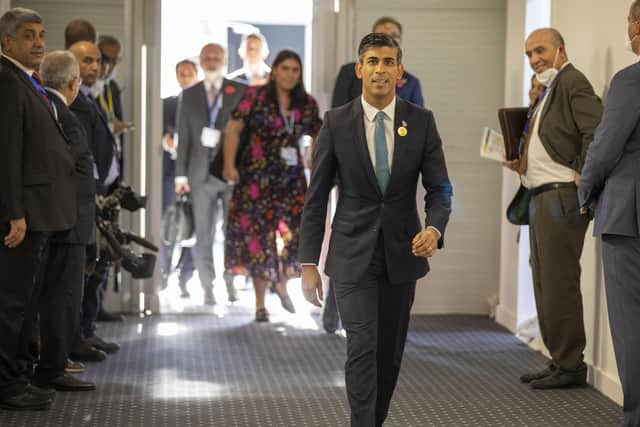Yorkshire can lead the way in new green industrial revolution: Asif Husain-Naviatti
Meanwhile the catastrophic flooding of more than a third of Pakistan this summer, the greater than ever proliferation of wildfires at the other side of the world in California and a hurricane season which cost over $1 billion in North America, provide testimony to the looming crisis and its global and diverse consequences.
Hordes of civil society organisations, youth movements and influencers present in Sharm El-Sheikh represented us – the millions and billions of ordinary people, especially young people, impacted increasingly by climate change.
Advertisement
Hide AdAdvertisement
Hide AdThe conference took place amidst a dramatic cocktail of devastating events and developments.


From the threats to peace and stability on Europe’s very doorstop in Ukraine, to an intensifying energy crisis as the cold months set in, to the struggling global economy, the world already has enough to worry about.
Climate change is slow onset, but its catastrophic effects are more costly to human lives, human livelihoods and human existence than all the other crises.
It is also more costly financially to deal with and is becoming ever more so each year.
Advertisement
Hide AdAdvertisement
Hide AdSignificantly, climate negotiators agreed to set up a fund to tackle loss and damage, recognising that the big historical carbon emitters of the past – the US, the UK and a number of European countries among them – bear some responsibility for the effects being felt today everywhere.
This comes rather close to issues of liability, compensation or even reparation.
It was never going to be an easy win for the Small Island Pacific states, who initially championed the proposal as an existential issue. Rapidly rising sea levels may soon swallow up their nations.
An important step then, but we still don’t know who will fund it, who will benefit from it, what such a fund will look like and indeed nearly every other detail.
Advertisement
Hide AdAdvertisement
Hide AdGlobal costs have been estimated in the hundreds of billions, but mere millions have been pledged so far.
There were two other glaring omissions in light of global crisis – even a slow onset one: no phase down of oil and gas to add to last year’s successful promise to phase down coal extraction, and no reference to peaking emissions before 2025.
This may seem a world away from Yorkshire. But it’s not. We experience climate change through increasingly erratic weather patterns, producing winter flooding, summer droughts and unseasonal seasons.
It confuses nature, upends agriculture and strains our basic infrastructure, leading to dramatically rising mitigation costs. Moreover, the history of carbonisation, industrial development and technological change, which brought about global warming, is ours.
Advertisement
Hide AdAdvertisement
Hide AdThe industrial North of England was the home of the industrial revolution. Our ancestors mined the coal which powered up the world. We developed the steel-making processes which built it. We invented the first machines which propelled it forwards.
The industrial revolution is a story of British hard work and innovation, which brought wealth, prosperity and rapid development to large swathes of the planet.
It is ultimately the foundation of every modern comfort we know today and continues to be the hope on which the poorest nations still hang for a better and more liveable future.
The loss and damage discussion is about the social justice dimensions of global climate insecurity brought about by sustained historic and continuing carbon extraction versus the future it leaves behind if this continues.
Advertisement
Hide AdAdvertisement
Hide AdYorkshire’s coal and steel legacy is also a powerful foundation for the next phase in industrial innovation and technological change built upon the knowledge and expertise that a well-developed industry has left behind.
Carbon-based industrial development is not a destination point.
It is a phase we passed through and a significant enabler to where we want to go.
We need to be as technically innovative and imaginative as our ancestors were before us.
Advertisement
Hide AdAdvertisement
Hide AdWe need to develop alternative fuels and new processes suitable for a new industrial age.
There are some examples in the region. ITM Technologies, based in Sheffield, is one such pioneer of electrolyser technology towards green hydrogen as a clean fuel, backed by some of the world’s largest energy concerns.
Linking modern manufacturing with technological research, the University of Sheffield’s Research Centres for Advanced Manufacturing and Transnational Energy are well placed to build on South Yorkshire’s lead in by-gone industrial development. And Yorkshire has a hard-working population seeking new skills to build upon the paths set by their forebears.
The environment is about much more than nature conservation and climate change calls for a graduation from the industry of the past. The future is still unfolding. Is this not another era of technological change? Yorkshire – the heart of the original industrial revolution – has a big leadership role to play.
Asif Husain-Naviatti, originally from Rotherham, has over 25 years of experience at the UN, World Bank and other international organisations on sustainable development.